|
|
|
Sort Order |
|
|
|
Items / Page
|
|
|
|
|
|
|
| Srl | Item |
| 1 |
ID:
157268
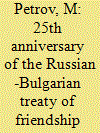

|
|
|
|
|
| Summary/Abstract |
RUSSIA AND BULGARIA have a very extensive history of relations that goes back ages and that has ensured the mutual spiritual enrichment of our nations. For instance, in the 10th-13th centuries, Bulgaria made a significant contribution to fostering Christian culture in Rus [Old Russia] and in the 19th century, the Russian empire played a decisive role in the formation of the sovereign Bulgarian state. Our bilateral ties were not devoid of painful downturns and setbacks as evidenced, in particular, by the breaking of diplomatic relations in 1886, 1915 and 1944. Every time, however, Russia and Bulgaria found ways of restoring the level of cooperation that had been achieved and sometimes even surpassing it.
|
|
|
|
|
|
|
|
|
|
|
|
|
|
|
|
| 2 |
ID:
157271
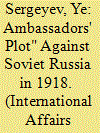

|
|
|
|
|
| Summary/Abstract |
The several weeks in August-September 1918 when the Soviet regime, barely 12 months old, was hanging by a thread (which Bolshevik leaders also admitted) can be described as the most dramatic period in the history of Soviet-British relations. An open armed intervention of the Entente powers that sided with the anti-Communist forces threatened to bury the hopes of Lenin and his comrades-in-arms to retain power in expectation of a worldwide revolution. Indeed, Soviet power was liquidated practically across the entire country (with the exception of several gubernias of its European part) while riots and conspiracies in the capitals and the biggest cities and the ongoing world war were ruining the country's economy and bringing hunger and epidemics.
|
|
|
|
|
|
|
|
|
|
|
|
|
|
|
|
| 3 |
ID:
157273
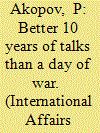

|
|
|
|
|
| Summary/Abstract |
ANDREI GROMYKO, an outstanding politician and diplomat, used to say: "Better 10 years of talks than a day of war." I often heard him say this - a saying that has now effectively become an aphorism. He regarded bilateral and multilateral talks as an important diplomatic tool that should be used in national interests. At the same time, Gromyko stressed that talks should be conducted by relying on economic power, not from a position of strength.
|
|
|
|
|
|
|
|
|
|
|
|
|
|
|
|
| 4 |
ID:
157263


|
|
|
|
|
| Summary/Abstract |
ELECTED IN OCTOBER 2015 due to his widespread support in Quebec, Justin Trudeau (of the Liberal Party of Canada) came to power with promises to change foreign policy and elevate Canada's role as a global actor after nine years of rule by the Conservative Party. Two years after Trudeau assumed the post of prime minister, however, analysis of his government's foreign policy shows it is closer to that of the Conservative government of Stephen Harper (2006-2015), which was characterized by close ties to the foreign policies of the United States and Israel, than it is to the foreign policy of his Liberal predecessor, Prime Minister Jean Chretien (1993-2003), which was against the unilateral invasion of Iraq by the United States and Great Britain in 2003.
|
|
|
|
|
|
|
|
|
|
|
|
|
|
|
|
| 5 |
ID:
157259
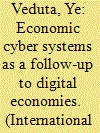

|
|
|
|
|
| Summary/Abstract |
TODAY'S GLOBAL CRISIS, which manifests itself in increasing chaos, has given rise to problems that civilization has never had before. The habitual method of global use of armed force cannot solve any of them. Russian President Vladimir Putin has said in a speech at a session of the UN General Assembly in New York that exporting social experiments has tragic consequences and can have degrading effects on societies. He argued that a digital economy is essential as an instrument for tackling global tasks. A digital economy sets "a new paradigm for the development of the state, the economy, and society as a whole" and involves the use of information technology (IT) to make governance more efficient.1 There exist two fundamentally different principles for building a digital economy.
|
|
|
|
|
|
|
|
|
|
|
|
|
|
|
|
| 6 |
ID:
157262
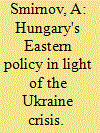

|
|
|
|
|
| Summary/Abstract |
THE ONGOING UKRAINE CRISIS has been a harsh trial for Russia and the European Union; it has been especially painful for countries that recently became members of a united Europe. The reasons for this are their territorial proximity to a hotbed of tension and their special historical relation to Ukrainian affairs. This is especially true for Ukraine's immediate Western neighbors: Hungary, Poland, Slovakia, and Romania. Their attitude to the situation is in one way or another associated with the problem of Ukrainian sovereignty, as it is understood and perceived by the government of each country.
|
|
|
|
|
|
|
|
|
|
|
|
|
|
|
|
| 7 |
ID:
157260
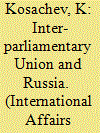

|
|
|
|
|
| Summary/Abstract |
ON OCTOBER 14, 2017, the 137th Assembly of the Interparliamentary Union (IPU), the oldest international political organization, will open in St. Petersburg. It may be recalled that the previous, 136th Assembly that took place in Dhaka, Bangladesh, preparations for which were widely covered in International Affairs,1 was truly historic for the Russian delegation. For the first time in 20 years, Russia initiated an IPU draft resolution on a very important and relevant subject, "The Role of Parliament in Respecting the Principle of Non-intervention in the Internal Affairs of States," receiving overwhelming support from the majority of national delegations and ensuring its adoption by consensus.
|
|
|
|
|
|
|
|
|
|
|
|
|
|
|
|
| 8 |
ID:
157275


|
|
|
|
|
| Summary/Abstract |
THE RUSSIA-ISLAMIC WORLD GROUP of Strategic Vision has brought out an extensive study of Islamophobia - a Russian translation of Islamophobia: From Confrontation to Cooperation by Ekmeleddin Ihsanoglu.* Ekmeleddin Ihsanoglu is a Turkish academic and diplomat who from 2005 to 2013 was secretary-general of the Organisation of Islamic Cooperation (OIC), the world's second-largest organization in terms of the number of people it represents.
|
|
|
|
|
|
|
|
|
|
|
|
|
|
|
|
| 9 |
ID:
157261
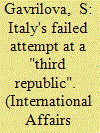

|
|
|
|
|
| Summary/Abstract |
ITALY IS AGAIN at a crossroads. An attempt to carry out a constitutional reform that would have changed the country's political system has fallen through. Italy faces a new political crisis as the ruling party's policy is increasingly rejected both by the opposition and by the population. Where the nation will go from now on depends on a set of factors in its economy and its domestic and foreign policy. To make matters worse, developments in Italy are a source of special concern for the European Union. With the EU being plagued by economic, political and social crises, domestic instability in member countries causes it particular anxiety. The situation in Italy, which is one of the founders and leaders of the EU, exercises a direct effect on the pan-European political climate. Due to the high degree of mutual integration of the economies and political systems of the member countries, political instability in Italy threatens the stability of the EU as a whole.
|
|
|
|
|
|
|
|
|
|
|
|
|
|
|
|
| 10 |
ID:
157255


|
|
|
|
|
| Summary/Abstract |
PARLIAMENTARY ELECTIONS on September 24 were a sad experience for Germany's political heavyweights, the Christian Democratic Union (CDU) and the Social Democratic Party (SPD). Each of them suffered the heaviest defeat in its history, CDU mustering just 32.9% and the SPD 20.5% of votes.1 Angela Merkel lost 8% and Martin Schulz 5% of their regular voters. The Christian Democrats hadn't done so badly since 1949, and the Social Democrats got fewer votes than they had during the reign of Kaiser Wilhelm in 1913. According to a survey, more than 60% of Germans said that they couldn't understand why they needed the SPD at all because there was no difference between its platform and the postulates of the CDU.
|
|
|
|
|
|
|
|
|
|
|
|
|
|
|
|
| 11 |
ID:
157265


|
|
|
|
|
| Summary/Abstract |
It is only natural that Russian regions have been stepping up their international activity and have been concerned over international problems. They have been directly drawn into international processes by globalization. Foreign economic activities have become an important feature of social and economic development for many Russian regions and the dominant social and economic factor for some of them. After the collapse of the Soviet Union, which entailed the severance of long-time ties that its command economy had brought into being, many of Russia's regions saw international activities as a way to improve their difficult social and economic situation. However, there are clearly legal boundaries for such activities - they must not contravene the national interests of the Russian Federation.
|
|
|
|
|
|
|
|
|
|
|
|
|
|
|
|
| 12 |
ID:
157256


|
|
|
|
|
| Summary/Abstract |
THE MINSK PROCESS, a string of diplomatic efforts to settle the conflict in southeastern Ukraine, has gone into its fourth year. By and large, it has been given less than enthusiastic assessments from day one. There have been comments ranging from terse and moderately optimistic ("quite constructive, and although no breakthroughs were posted, this stage [the first round of 'Normandy format' talks between Russia, Ukraine, Germany, and France] had certain benefits"1) to openly fatalistic ("the Minsk agreements are a stillborn baby"2). Judgments such as the latter statement, which earlier on mainly came from Ukrainian politicians, are increasingly widespread today.
|
|
|
|
|
|
|
|
|
|
|
|
|
|
|
|
| 13 |
ID:
157266


|
|
|
|
|
| Summary/Abstract |
THE FORM of individual participation in the political organization of the state that stems from and was upheld by European and Christian civilization throughout the development of mankind has undergone a metamorphosis, losing one set of features and acquiring another. No one can say that democracy as a form of expressing the will of the majority of the electorate is perfect. While its earlier forms were practiced in the comparatively small Greek republics and cities of France in the 18th century, both of which were monocultural and monoethnic societies, a fundamentally different reality applies today.
|
|
|
|
|
|
|
|
|
|
|
|
|
|
|
|
| 14 |
ID:
157270
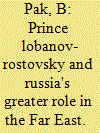

|
|
|
|
|
| Summary/Abstract |
ONE OF THE PLACES OF HONOR among the outstanding statesmen of Russia who served as its foreign ministers belongs to Prince Alexey Lobanov-Rostovsky.* At 35, he was appointed Envoy Extraordinary and Minister Plenipotentiary in Constantinople (1859-1863); later, he returned to the Ottoman Empire as Ambassador Extraordinary and Plenipotentiary (1878-1879) and served in the same rank in London (1879-1882) and Vienna (1882-1895). On February 26 (March 10), 1895, Nicholas II made him foreign minister.
|
|
|
|
|
|
|
|
|
|
|
|
|
|
|
|
| 15 |
ID:
157269


|
|
|
|
|
| Summary/Abstract |
IN ORDER TO UNDERSTAND current relations between the Republic of Kazakhstan (RK) and the Russian Federation (RF), it makes sense to go back more than 25 years to the period before Kazakhstan and Russia became sovereign states. After all, these relations did not start from scratch. The common life of the republics in the Soviet Union was full of different forms of cooperation and interaction in all spheres, and their development experience on the eve of 1991 was complementary.
|
|
|
|
|
|
|
|
|
|
|
|
|
|
|
|
| 16 |
ID:
157267
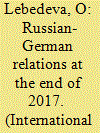

|
|
|
|
|
| Summary/Abstract |
THE LARGE AMOUNT of foreign policy work done by the Russian leadership in recent years has proven insufficient to fill gaps in social and economic statistics. This work mainly focused on measures to attract foreign investors and to raise the investment attractiveness of Russia. Measures to intensify cross-border movement of capital and attract "smart money" to Russia have been seriously impeded by economic determinism and overlooked many aspects of international relations.
|
|
|
|
|
|
|
|
|
|
|
|
|
|
|
|
| 17 |
ID:
157257


|
|
|
|
|
| Summary/Abstract |
RUSSIA'S POSITION on territorial and border conflicts in East Asia arouses great interest. Most of these conflicts have deep roots in and are consequences of the Cold War, primarily stemming from legal gaps in the system of interstate borders that is based on the San Francisco Peace Treaty.
|
|
|
|
|
|
|
|
|
|
|
|
|
|
|
|
| 18 |
ID:
157272


|
|
|
|
|
| Summary/Abstract |
JAPAN'S ATTACK on Pearl Harbor, the United States' naval base in Hawaii, on December 7, 1941, started large-scale military operations in the APR. In a few days, the correlation of forces in the eastern periphery of World War Two changed dramatically and the number of states fighting on both sides increased. On December 8-12, 1941, the United States, Great Britain, Australia, New Zealand, Canada and several other states declared war on Japan at sea and on land. On December 9, 1941, China, having declared war on Japan, Germany and Italy, launched land operations against Tokyo; two days later, Germany and Italy joined the fighting against the United States and turned World War Two into a global war.
|
|
|
|
|
|
|
|
|
|
|
|
|
|
|
|
| 19 |
ID:
157274


|
|
|
|
|
| Summary/Abstract |
VALINASR is an expert on the problems of the Middle East, a fellow at Tufts University's Fletcher School of Diplomacy, dean of the Paul Henry Nitze School of Advanced International Studies at Johns Hopkins University, and a senior fellow in foreign policy at the Brookings Institution. In his book The Dispensable Nation: American Foreign Policy in Retreat,* Nasr tells of his two years of working at the U.S. State Department during the administration of Barack Obama. Nasr's work is distinguished by its deep analysis of the socioeconomic and political processes now under way in the Middle East.
|
|
|
|
|
|
|
|
|
|
|
|
|
|
|
|
| 20 |
ID:
157253


|
|
|
|
|
| Summary/Abstract |
WITHOUT EXCEPTION, the tectonic shifts now taking place in the infrastructures of today's world under the conditions of globalization and the information and telecommunications revolution are together leading toward a radical change in the place, role, and influence of nations and peoples in the system of international relations. It is therefore natural to expect a gradual rethinking of the traditionally understood categories of world order, hegemony, dominance and submission, the places and roles of small nations, the character of the configuration of geopolitical forces, and so on. Of special relevance are the status of and outlook for the superpowers, and the phenomenon of superpower status itself. As is well known, against the backdrop of the triumph of the West and the United States, there was originally the conviction that a so-called unipolar world order had arrived, at the summit of which Uncle Sam was enthroned in splendid isolation.
|
|
|
|
|
|
|
|
|
|
|
|
|
|
|
|
|
|
|
|
|